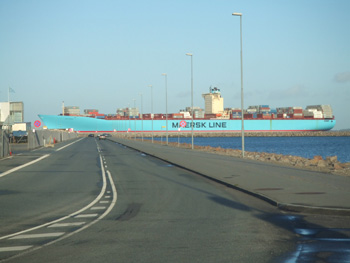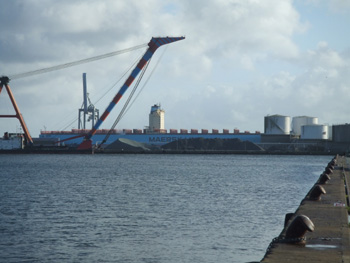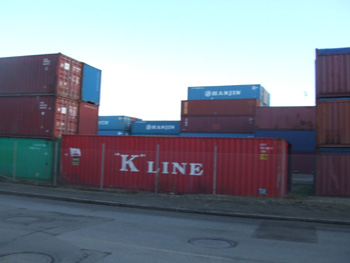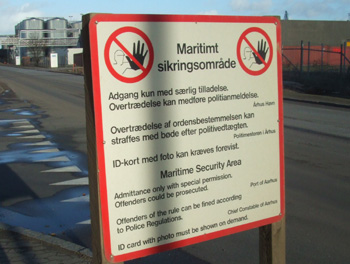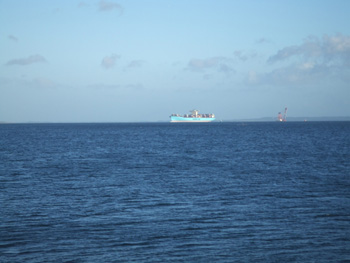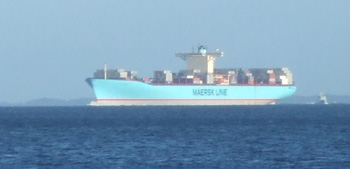We are developing the social individualist meta-context for the future. From the very serious to the extremely frivolous... lets see what is on the mind of the Samizdata people.
Samizdata, derived from Samizdat /n. - a system of clandestine publication of banned literature in the USSR [Russ.,= self-publishing house]
|
Is the UKIP really a single issue party any more? I have been asking that question for a few months now and I keep being pleasantly surprised by the answer. Sure, I am all for getting out of the EU but that does not change the fact that the biggest threat to the liberty of British people is very much home grown. Just ditching the EU is not enough, not by a long shot.
However more and more the UKIP seems to be sounding more than just a single drum beat… their latest satirical offering on the web is not just about the €uro-nanny superstate but rather just about the nanny state in all its forms and its message is overtly anti-Big Government… and not just Big Government from Brussels, the tag-line “Big Government needs little Hitlers”. Outstanding.
It would appear their slogan of It’s time we governed ourselves! means not just independence from the corrupt political machine in Brussels but time we as individuals had more ability to govern our own private affairs without domestic nanny-states and nanny-super-states alike regulating every aspect of life.
I may not agree with all their platform but more and more frequently they are putting out messages I can get behind without any problem at all.
“Progressive taxes do not redistribute income. They redistribute taxpayers.”
George Gilder, one of the early evangelists for “supply-side” economics, which is a fancy way of saying that he thinks people respond to incentives, considered a wild-eyed idea by some people.
Apologies for not flagging up sooner that I recently had a recorded conversation about Samizdata with Perry de Havilland. It took me over a week to edit the thing, by which I mean over a week to get around to stitching the two chunks it happened in together (I find everything involving computers to be hard until I know how to do it). And after posting about it on my blog, it has taken me another two days to mention it here. I had a busy weekend. But the mills of Samizdata grind small, and slowly. A week and a half’s delay will make no huge difference to the big picture, or to the meta-context as Perry likes to call it.
Anyway, click here to have a listen. It lasts about forty minutes.
Our conversation reminded me of something I first heard myself say to Madsen Pirie a long time ago, in the old Alternative Bookshop. What will this achieve? – said Madsen, waving some pamphlet I had just done in my face. I replied: “In the short run, nothing. In the long run, everything.” Samizdata is like that.
Jackie D liked it too.
Today, assuming the plan goes according to plan, I will be doing another of these things, with Alex Singleton, about… Gilbert and Sullivan. There is more to life than what governments do.
It is presently 2.42 am in Seoul. I am suffering from jetlag (Making an eastern journey with a nine hour time difference is especially brutal). I went to bed at about 6pm yesterday evening, and I have therefore just woken up, and I have a few hours to while away, . Buying an international power adaptor in the largest electronics market in Asia did not turn out to be particularly difficult, so thankfully I do not have to ration electrons this morning and I have my laptop and the internet. This makes lying awake in a foreign city with jetlag somewhat more bearable than it has been at some times in the past, and it makes the hour I spent making sure that the versions of my music and photo libraries, my e-mail archive, and various other things that are stored on my laptop were fully up to date were well worth it.
In a way, though, this is kind of relaxing. I have no other obligations for the next few hours. The last few months have been extraordinarily hectic for me. My team at work has been seriously understaffed (we have had great difficulty hiring good people), it has been bonus season, and the total workload has risen. I have been working ridiculous hours, and things like blogging have been lost in the rush. Suddenly, though, I am on holiday, and due to the absence of any GSM mobile phone networks in Korea my mobile phone and Blackberry suddenly don’t work, so my colleagues do not know how to contact me even if they wanted to. I am out of touch and have no immediate obligations to anybody, particularly when jetlagged early on a Sunday morning.
However, I do have an obligation to the people of Samizdata. I am yet to explain why I was in Denmark on November 11.
The reason is actually fairly simple. I went to see Emma Maersk, the largest container ship in the world, at the end of its first trip from Europe to Asia and back. After being built in the shipyards of the Danish city of Odense and being christened on August 12, the ship had sailed from its home port of Aarhus to Gothenburg, Bremerhaven, Rotterdam, Algeciras, the Suez Canal, Singapore, Yantian (Shenzhen), Kobe, Nagoya, Yokohama, Yantian, Hong Kong, Tanjung Pelepas, the Suez Canal, Felixstowe, Rotterdam, Bremerhaven and Gothenburg, and was scheduled to arrive back in Aarhus at 1pm on November 11. Upon reading about the ship in various places, I thought it would be nice to go and actually look at her. I could have gone to see her in Felixstowe in Suffolk on November 4, but that was a weekday. In any event, low cost air travel in Europe has reached the point where it is no harder or more expensive to go to Aarhus than it is to go to Felixstowe, so I thought “what the heck” and spent about $60 on a return plane ticket.
After getting to Aarhus, and a semi-leisurely half hour in a coffee house, I headed down to the port. The AP Moller terminal was on the far side of the port, and I knew I would have a lovely view of the ship across the harbour if she were in the berth closest to the harbour entrance. If she was to dock at a berth further up the port, there would be other terminals in the way. But in any event, I would have a nice view as she sailed into the harbour. I might have to wait in the cold for an hour or so, but I would at least see her come in, which was why I was in port.
However, I was thoroughly confused when I walked to the harbour and saw this.
Yes, it was a big container ship in Maersk livery that looked exactly like the pictures of the Emma Maersk I had seen in photographs, but it was there prior to the scheduled arrival time, and it was not carrying a large load of containers, as one would expect if it had just sailed in from China. I knew that Maersk were building more ships in the same class, but I had not realised that any were completed. So I spent the next couple of hours wondering whether Emma Maersk had arrived early and had been rapidly unloaded (but container ships like this are never completely unloaded), whether I was confusing a smaller ship in a different class with Emma Maersk, or whether a new ship had arrived in port prior to its maiden voyage. Only one of these explanations made consistent sense, but I did not want to miss seeing what I had come for, regardless of explanations and sense.
In any event, the view was not very good. I needed to walk around the harbour to get a better view, at least to the extent that I was permitted to. (People tend to sometimes get nervous these days when you wander around and take photographs of critical infrastructure). And I wasn’t sure where the roads went, and stuff like that. However, I gradually made my way around the port, towards the outer breakwater and the AP Moller terminal.
I do like the observation that I could be prosecuted. Presumably, after they figured out I was a banker/blogger/ship spotter/Danish cheese fan/beer drinker, I would not have been prosecuted, but it was in truth a good thing that I turned around and left the Secure Maritime Area, because I would not have otherwise reached the outer breakwater in time
When I got there, I now had a much better view of the AP Moller terminal, the ship already in port, and the open sea. And look what was sailing towards port?
Clearly, this was Emma Maersk. → Continue reading: Watching big ships
The only way to view the present, imploding Labour government as it fights over the cash-for-peerages issue, is like a bunch of street rats at each others’ throats. This story in the Sunday Telegraph states that Tony Blair is willing to let one of his top cronies and fund-raisers, Lord Levy, take the hit for the scandal.
In many ways, what strikes me as so distinctive about this government and its ministers is that the big bust-ups, the big fights, were not on issues of principle. At least the Tories, for all their manifest faults, fell out over things like the euro and the Maastricht Treaty, which were serious, major issues. But then the Tories were once a grown-up party, with grown-up people in it like Margaret Thatcher, Geoffrey Howe and Nigel Lawson. Say what you like about these personages, but their rows were over issues of major substance.
It seems an awfully long time ago.
Hosting company ‘Watching America’ are currently under a sustained (two days and counting) denial-of-service attack and as a result various blogs may be hard or impossible to access as a result. Consider this a public service announcement. Methinks some lynchings are in order.
I had the pleasure of meeting U.S. blogger Stephen Green, of the excellently entitled Vodkapundit, a few months ago at a party in London. Stephen has been ill, lost a lot of weight, and I must say I got quite concerned when he stopped posting. He now explains what has been going on. It looks as if the fella is going to be all right, which is terrific news for him and his wife and child. Feel free to nip over to his site and give him your best wishes.
I am looking forward to the Colorado Scribe posting up more of those cocktail recipes again. Mine’s a gin and tonic.
If you want to make money, work directly with money.
– Bernie Cornfeld’s explanation of Jonathan’s puzzle. Financial markets seek meaning, and discount luck. Financiers are therefore in a strong position to get rent from their luck as well as their brains. And a lot of other people’s money passes through their hands, so they do not have to worry about cashflow much.
There is an article in the ‘Independent‘ regarding the report stating that the case made by HMG for attacking Iraq and deposing the Ba’athist regime was a big fat pack of lies. And, if your primary justification for supporting bringing down Saddam Hussain was the threat of WMDs, then this is probably alarming new (and that was indeed the core of the UK and US government’s case).
If however your reason for supporting the ouster of Saddam Hussain was not the same as Tony Blair or George Bush… who cares? Sure, I bought the logic of Saddam having a WMD programme as his behaviour seems to suggest it, but that was always just one of many reasons to want him gone. Those of us on record as taking a rather different line regarding the main reason to go in (i.e. he is a mass murdering tyrant and deposing him will not start WWIII) are unlikely to lose much sleep over these revelations.
The article says the government lied. Well I’ll be, the government lying? Who’d a thunked it? No, if you supported getting rid of Saddam Hussain because you see deposing tyrants with volunteer armies as a good in and of itself, and would rather see your tax money spent on that rather than all the other crap it gets spent on, do not need to change their position one whole hell of a lot due to this. Really if you did not (and do not) buy the argument that leaving the mass murderer from Tikrit and his psychopathic sons in charge would be ‘okay’ and in the interests of people in Iraq, then the UK and US governments problems are of only incidental interest.
Am I happy about how the post-war insurgency has been handled and the preposterous obsession with imposing ‘democracy’ in a tribalised society? No, not at all, and I am astonished that the US seems to have unlearned so many of the lessons of the Vietnam War… but in the overall scheme of things I am still of the view that the world is better off without Saddam Hussain.
In fact, seeing Tony and Dubya in political difficulties as a consequence of their own mis-judgements is hardly bad news but is perhaps the best of all possible worlds. Saddam gone, the home grown US and UK Big Government administrations in trouble… yeah I can live with that.
Frank Johnson (journalist, editor, columnist and all round newspaper man) has died at the age of 63.
Mr Johnson was of working class origins in the East End of London and left school at 16. However, he never viewed any of this as a reason why he should be hostile to high culture and from his boyhood was a great admirer of opera and ballet. Indeed Frank Johnson was fond of pointing out that many individuals among the working classes were once a lot more cultured than their self declared friends of more fortunate birth gave them credit for, with (for example) the biggest sales among early recordings of music being for serious works, and many men whose hands were hard often being also very well read.
Mr Johnson was no friend of the left – either in the Labour party, or of those in the Conservative party who were patronising statists (always out to ‘help’ the poor with more government spending, taxes and regulations).
Nor was Mr Johnson afraid to write unpopular things. For example he pointed out that for working men in the south of England and in the Midlands, the 1930’s were not a time of collapse, indeed that Britain did better in terms of the rise of real incomes in the 1930’s than National Socialist Germany – and vastly better than FDR’s vaunted ‘New Deal’ United States.
As for the sacred cow of British politics – the Welfare State, Frank Johnson pointed out that it is not a matter of it being “something designed in the 1940’s which must be adapted for changing times” (as cowardly people on the conservative side of British politics used to like to put it), but something that had a powerful negative side from day one, both collectivising hospitals that had been provided free for the poor by charitable effort and helping to destroy the tradition of self help and mutual aid that had once been the greatest aspect of the working classes (of course such things as the Friendly Society movement had been undermined by government activities all the way back to the early schemes of the ‘New Liberal’ government that was elected in 1906).
Even the supposed higher living standards of the 1940’s being an illusion – the war time “prosperity” (boasted of by upper class leftists like A.W. Benn) being a matter of American aid and eating our overseas investments. And the post war time being a matter of rigged stats (claiming that wages were higher than the 1930’s whilst ignoring real inflation – i.e. the black market price of rationed goods) and neglecting future investment. Although it is worth remembering that government spending on the Welfare State started off in a very small way (the real economic harm of the late 1940’s being nationalization, general high taxes and high government spending and the vast web of regulations by which the “educated” men in Whitehall told everyone else what to do and what to do). The real growth of the Welfare State and, more imporantly the changes it was making in the British character (as opposed to such things as the decline of the Friendly Societies and other voluntary associations), did not really even start to be seen till the 1960’s
Mr Johnson remembered the “stoicism of the London working class” (of course he accepted it was more than the London working class – but he was a Londoner), as to what there is now it is best to say nothing.
I will miss Frank Johnson.
Considering that investment bankers at places like Goldman Sachs and Morgan Stanley are paid the sort of money that sounds like a respectable cricket score, economics writer Arnold Kling asks the question: why is the supply of people to do this job not rising in response to a very juicy lump of money? It is a good question to ask. For the sort of money on offer, even a maths dunce like your humble scribe might want to learn to do the job and start figuring out the the clever-dick arts of hedge funds, credit derivatives and leveraged buyouts. So why is the supply not rising? I think some of this may be caused by a lack of talented folk coming out of our education system, but that cannot really explain it over the long-term. It may be that getting the level of experience to do these jobs is quite high, raising the scarcity and hence the massive rewards. Of course when these guys get fired for failing to perform, this rarely bothers people who get upset about the big salaries.
These guys have a rather, er, different take on the matter.
It is snowing.

It may be that this is the first snow of the winter, or at least that at does not snow here all that often, because the locals seemed quite excited about it, but did not seem to be particularly well prepared for it.

I am here for a few days on my way to Australia for Christmas. So far Seoul seems to be very modern. The new Incheon airport is superb – a wonderful contrast to the horrors of Heathrow yesterday. Like Tokyo, it is a fine city to discover on foot, as there are all kinds of interesting little restaurants, shrines, and all kinds of things down little narrow streets.
More from me over the next few days…
…At least, I hope so. Due to the fact that Korea uses some of the world’s weirdest electricity (220V 60Hz), it did not really occur to me that they would use a standard (continental European) type C plug, so for some idiotic reason I failed to bring a type C adaptor, although I brought most other adaptors known to man. Therefore, until I find an adaptor or a power cable with a different plug on it or something, I have only the small remaining amount of electricity I brought with me from England to power my laptop. In the morning I will go to what my guidebook describes as “the largest electronics market in Asia” where I can hopefully solve this problem. I will also see if it is genuinely larger than electronics markets I have been to in other parts of Asia, and I shall also contemplate the question of where any other bigger electronics markets that are not in Asia might be.
|
Who Are We? The Samizdata people are a bunch of sinister and heavily armed globalist illuminati who seek to infect the entire world with the values of personal liberty and several property. Amongst our many crimes is a sense of humour and the intermittent use of British spelling.
We are also a varied group made up of social individualists, classical liberals, whigs, libertarians, extropians, futurists, ‘Porcupines’, Karl Popper fetishists, recovering neo-conservatives, crazed Ayn Rand worshipers, over-caffeinated Virginia Postrel devotees, witty Frédéric Bastiat wannabes, cypherpunks, minarchists, kritarchists and wild-eyed anarcho-capitalists from Britain, North America, Australia and Europe.
|
